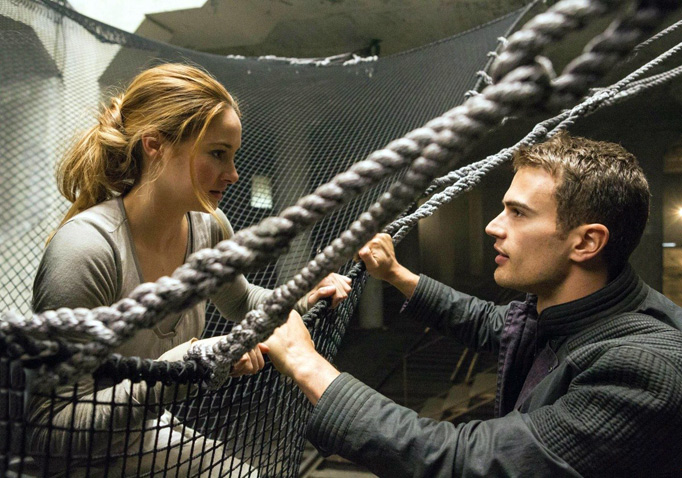
The cornerstone of young adult fiction is its exploration of personal, emotional issues through the filter of ridiculously high stakes, not the least of which because teenagers equate their feelings with the center of the universe. But when film adaptations of that material build real universes to physically embody those issues, the results are decidedly mixed, exemplified by Neil Burger’s realization of “Divergent.”
Using Veronica Roth’s dystopian future as the foundation for a story of self-actualization, Burger succeeds in aping the cool proficiency of its obvious cinematic predecessor, “The Hunger Games,” unfortunately without elevating Roth’s concept to more than an effective if slightly overwrought academic exercise.

Shailene Woodley (“The Spectacular Now”) plays Tris, a young woman raised in a futuristic society where its citizens are divided into five factions: Abnegation, Amity, Candor, Erudite, and Dauntless. Tested for her aptitude in each, her results come back inconclusive—“divergent,” a forbidden designation since it violates the one-quality-per-person system installed by the government. But when she’s allowed to choose which faction she wants to join, she picks Dauntless, and soon finds herself being trained by Four (Theo James) to defend society from invisible threats that lurk beyond the city walls.
Struggling to keep pace physically but outclassing her fellow trainees in strategy and planning, Tris is forced to hide her gifts in order not to attract the attention of government leaders, like Jeanine Matthews (Kate Winslet), and Erudite, to whom divergents are seen as a threat. But when Erudite stages a coup to overthrow Abnegation’s rule using Dauntless’ ranks as enforcers, Tris finds herself not only in a fight for her life, but all of society as civil war erupts between factions.

At almost 140 minutes, there’s no better way to describe “Divergent” than as a bit of a slog. Where at the very least “The Hunger Games” (and its sequel) shuffled quickly from macro to micro with its world building, Burger’s film takes its time introducing the idea of factions, and devotes enormous attention to Tris’ identity crisis before audiences get any real sense of the larger societal issues that will be explored.
But notwithstanding the ridiculousness of the notion that a society would ever consider this system an effective way of addressing its problems, needless to say there’s something provocative about the concept of a world that seems to have you figured out even before you do. In that regard, this is bullseye teen material, not just in terms of the practical challenges of choosing a college and a major, but the notion that every choice you make is not just defining, but evaluated by others, whether it’s how you dress or behave, what friends you pick, or what your appetites are.

That said, the way the movie defines the factions is thoughtful but indisputably silly. Members of Dauntless, for example, seem to run everywhere they go, and they travel by constantly running trains, which they jump on and off to board and disembark. Needless to say, the factions are all simplistically rendered, because they’re simplistically conceived, and while those primary colors provide the story with clear conflicts, they reduce the complexity of those conflicts, as if it’s remotely possible to simply focus on one personality characteristic, or switch off others, once a largely arbitrary decision has been made which is most important to each individual.
Thankfully, Woodley makes for more than uncertain enough of a hero to add detail and meaning to the implosion of this world. Not unlike “The Hunger Games” actress Jennifer Lawrence, there’s little artifice to her performance, and the mundane honesty of her reactions create a believability that the world would otherwise lack. As Four, meanwhile, James manages the considerable accomplishment of seeming like a real grown-up man rather than a teenage girl’s image of a dreamy boy, and he makes the character’s transformation from hardass to collaborator seem natural, if inevitable. Meanwhile, Winslet conveys one-dimensional menace in a way that is probably more attributable to the script than her skill as an actress.

But ultimately, the elasticity of the story—its sometimes lackadaisical, others aggressive pacing—is what may challenge audiences to embrace this in the way it has “The Hunger Games” even more than the silliness of its universe. Because there’s some genuinely great ideas in the film, and some terrific character work, but it’s given such uneven attention, alternately languished upon and glossed over, that the portrait Burger creates feels complete without, well, making us feel a whole lot else.
Ultimately, Burger’s film is, to its credit, probably second-best among the YA adaptations that Hollywood has mounted since “Twilight” put the subgenre on the map. But with a second installment already going into production, one hopes that the series’ world-building is done and its world-living can begin. Because the quality that “Divergent” still lacks is the broader emotional resonance that makes it distinctive—which is why, for the time being, it’s not yet being defined by anything other than what it isn’t. [B-]

